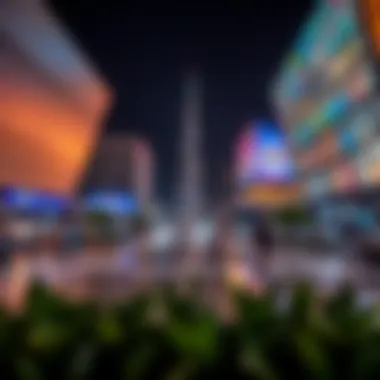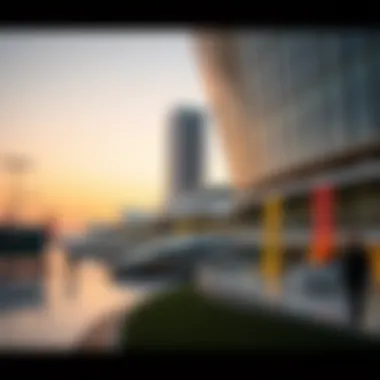Significance of Expo 2020 Dubai: Trade, Culture, and Legacy


Intro
In recent years, global exhibitions have staked their claim as pivotal platforms for international dialogue and investment. Amongst the myriad of these showcases, Expo 2020 Dubai stands tall, representing not just a mere exhibition but a remarkable convergence of cultures, innovation, and economic potential. This gathering has played a significant role in reshaping the economic landscape of Dubai and beyond. Let’s delve into the intricate layers of its significance, particularly focusing on market trends, investment strategies, and the broader implications of such monumental events.
Market Trends
Current Property Prices
The impact of Expo 2020 Dubai on the property market has been profound. Since the announcement of the event, property prices in the vicinity have witnessed a substantial uptick. For instance, areas like Dubai South, which is home to the Expo site, have seen property prices soar. Previously undervalued, this region is now one of the hottest commodities for investors and homeowners alike. By analyzing recent data, we see that prices jumped by approximately 15-20% on average in 2021 alone, outpacing growth in other parts of the city.
Not only are residential properties soaring, but commercial real estate has also seen a significant boost. Businesses eager to capitalize on the influx of visitors and increased city visibility are vying for prime locations near Expo-related developments. This trend points toward a promising growth trajectory in Dubai's property sector.
Future Market Predictions
Looking ahead, the implications of Expo 2020 on Dubai's real estate market are likely to unfold as follows:
- Continued Price Appreciation: Expectations suggest that property values will keep climbing post-expo, fueled by ongoing demand from expatriates and investors.
- Urban Growth: Developments spurred by the expo, including infrastructure enhancements, will likely lead to further growth in the housing market.
- Sustained Foreign Investment: With the global spotlight on Dubai, foreign investors may continue to pour capital into the city, enhancing market stability and driving prices up over time.
"Expo 2020 Dubai is not just an event; it is a launching pad for Dubai’s future as a global hub for business and culture."
Investment Strategies
Smart Buying Tips
Navigating the Dubai property market, especially post-expo, requires keen acumen. Here are some savvy pointers to keep in mind:
- Research Market Trends: Stay updated with property trends and understand the hotspots. Online platforms such as Property Finder can provide valuable insights.
- Leverage Real Estate Agents: Engage with experienced agents who have on-ground knowledge of the area, particularly those focusing on the Expo zones.
- Consider Off-Plan Properties: Investing in off-plan properties can be a more affordable option, especially as the area develops and prices rise.
Financing Options
For those looking to invest, understanding financing is critical. Here are several pathways:
- Mortgages: Many banks offer competitive mortgage rates tailored to expatriates and local investors. Entities like Emirates NBD or Dubai Islamic Bank can provide options.
- Cash Purchases: If feasible, cash purchases often give leverage during negotiations, especially in high-demand areas like those surrounding Expo.
- Investment Funds: Consider property investment funds that allow investors to pool resources and share risks while capitalizing on the rapid growth in Dubai’s market.
As you consider these strategies, keep in mind the importance of aligning your investment goals with the current landscape and emerging opportunities. With the interplay of past gains and the future potential illuminated by Expo 2020, Dubai stands as a beacon for investors and stakeholders alike.
Foreword to Expo Dubai
The world of international exhibitions, or expos, has long served as a platform for nations to showcase their achievements, innovations, and cultures. This leads us to Expo 2020 Dubai, a key event that took place in one of the most dynamic cities on the planet. While it faced a series of challenges due to the global pandemic, the expo ultimately represented more than just a collection of pavilions; it was a symbol of resilience, creativity, and progress. This introduction sets the stage for understanding the significance of this monumental gathering, which shaped dialogues around sustainability, technological advancement, and global connectivity.
Historical Context
Expo 2020 is particularly noteworthy when considered within a historical framework. The first World’s Fair dates back to 1851 in London, where nations vied for public attention by presenting their advancements in industry and culture. Fast forward to the modern era, and expos have evolved to encompass broader themes that address pressing issues facing humanity.
Dubai’s selection to host this prestigious event in 2013 marked a significant milestone in the Middle East, positioning it as a hub for global dialogue. The emirate's rapid transformation from a small trading post to a bustling metropolis underscores its capabilities to hosts such large-scale events. This backdrop is essential in appreciating how Expo 2020 served as a bridge, connecting diverse cultures while paving the way for future collaborations across borders.
Significance of the Event
The significance of Expo 2020 remains layered, impacting stakeholders from various sectors. For investors and developers, the expo provided a unique opportunity to tap into Dubai's rapidly growing economy. The event showcased what the city has to offer while drawing global attention and investment.
Moreover, it served as a meeting point for cultures, ideas, and innovations. Visitors from around the globe experienced the innovative projects and sustainable practices presented by numerous countries. Such interactions fostered not just business relationships but a deeper understanding among nations.
"Expo 2020 Dubai was not merely an event; it was a reminder of humanity's persistent drive towards progress, even through adversity."
Additionally, the focus on themes like sustainability, mobility, and opportunity elicited a robust conversation about the future of our planet. Countries came together to propose solutions, strategies, and technologies aimed at addressing some of the most pressing challenges of our time.
In summary, the historical context and significance of Expo 2020 Dubai create a framework for analyzing its impacts and legacies. It's imperative to view the event through various lenses—whether one is an investor seeking sound economic prospects or a cultural enthusiast wanting to explore the world's narratives—thus enriching our understanding of Expo 2020's role in shaping the future.
Key Themes of Expo
The Key Themes of Expo 2020 serve as the backbone of this monumental event, illustrating not just the aspirations of the host nation, but also the collaborative spirit shared among participant countries. Each theme — Sustainability, Mobility, and Opportunity — resonates through the infrastructure, exhibits, and interactions, and reflects the burning issues and hopes of our time. Understanding these themes is essential for grasping the true essence of Expo 2020 and its far-reaching implications.
Sustainability
Sustainability was more than a buzzword at Expo 2020; it was a guiding principle. The expo demonstrated a commitment to preserving the planet for future generations, pushing initiatives that encourage responsible interaction with the environment. This theme was woven into the very fabric of the event, right down to the materials used for construction.
For instance, the Al Wasl Plaza featured a remarkable solar panel installation, designed to gather sun energy and feed it back into the expo's utilities. Such implementations are noble attempts at reducing carbon footprints and setting a precedent for other global events. By showcasing innovations in renewable energy, water conservation, and waste management, Expo 2020 sent a clear message: sustainability isn't just possible, it's imperative.
Moreover, by investing in these practices, participating nations expressed their determination to tackle the environmental crises ahead. Cities worldwide now have a template to emulate, a testament to what collective effort can achieve.
Mobility
Mobility at Expo 2020 transcended mere transportation; it encapsulated the movement of ideas, people, and cultures. In our fast-paced world, how we travel impacts not only our daily lives but also global perspectives. The focus on mobility included everything from futuristic public transport solutions to smart city innovations.
One striking example was the introduction of the hyperloop concept, where speed and efficiency married technology and imagination. A visit to the Mobility Pavilion allowed attendees to experience what the future could look like with the adoption of such transformative technologies. This theme carried the notion of inclusivity as well; through partnerships and collaborations, nations explored how they could work together to create seamless mobility experiences in their own contexts.


The mobile solutions presented at Expo 2020 have sparked discussions around urban infrastructure and smart cities, pushing forward the agenda of better, equitable transport options for all. As cities modernize, these themes will surely ignite further innovation and investment from both public and private sectors.
Opportunity
Opportunity encapsulates the spirit of entrepreneurship that Expo 2020 sought to inspire. The theme was reflected in various initiatives designed to foster collaborations and connections among global business leaders, innovators, and thinkers.
Throughout the event, numerous forums and workshops aimed to create networking opportunities, empowering startups and established businesses alike. By focusing on cooperation over competition, Expo 2020 underscored the transformative potential of shared knowledge and resources. This philosophy extended beyond the event, fostering a climate ripe for future investments.
Additionally, initiatives like the Global Innovation Hub showcased budding technologies and startups that might shape the economies of tomorrow. By spotlighting such ventures, the expo catered not only to existing businesses but also to the future generation of entrepreneurs seeking to make their mark.
The key themes of Sustainability, Mobility, and Opportunity at Expo 2020 Dubai represent more than just categories; they embody collective aspirations and ignite discussions that will shape future policies and practices globally. Engaging with these themes offers a deeper insight into how nations can address pressing issues collaboratively, ensuring a brighter future for generations to come.
"From sustainability to mobility, the themes of Expo 2020 are not merely concepts but actionable steps we must take to secure our planet’s future."
For more information on the key themes and their implications, you can explore the official website of Expo 2020 Dubai.
For further reading on sustainability, visit Britannica's sustainability section. The future of mobility is discussed extensively on Wikipedia's mobility page.
For insight into entrepreneurship and opportunity, check the resources on reddit.com for discussions among business leaders.
Participation of Nations
The participation of nations in Expo 2020 is crucial to understanding its broader impact. This event is not just a showcase of innovation and culture; it creates a platform for countries to engage with one another and the wider world. The benefits of this participation can be manifold. Firstly, it promotes cultural exchange, as nations present their unique traditions, innovations, and perspectives. This fosters mutual respect and understanding, which is essential in today's interlinked societies.
When nations come together, each brings something distinct to the table. The diversity of experiences and knowledge leads to a richer dialogue. Besides, it opens doors for international cooperation on various fronts, including trade, technology, and education. The connections formed during the Expo can lead to lasting partnerships long after the event concludes.
Global Representation
The global representation at Expo 2020 is indicative of the changing dynamics in world affairs. More than 190 nations participated, showcasing not just their achievements but also addressing global challenges. This participation reflects a shared recognition that solutions to issues like climate change and sustainable development require an inclusive approach. With every nation presenting their narratives, the stage was set for exchange of ideas that can spark global initiatives.
Through participation, countries like Japan highlighted their technology advancements, while nations like Egypt showcased rich histories and cultural depth. Visitors walked through pavilions that reflected each country's vision, aspirations, and challenges, making the event a tapestry of humanity’s collective journey.
"Expo 2020 embodies a collective effort to face the pressing issues of our time, enabling nations to find common ground."
Unique Pavilions
The unique pavilions presented by each nation were more than just architectural feats; they served as microcosms of cultural identity. Countries invested heavily into their pavilions, crafting spaces that not only attracted visitors but also communicated their national narratives. For instance, the UAE's pavilion was a celebration of its history and ambitions, offering visitors insights into the nation’s vision for the future.
These pavilions also served as interactive platforms. Visitors engaged with exhibits that pulled them into the experiences being showcased. From immersive art installations to cutting-edge technology displays, the uniqueness of each pavilion heightened the overall experience.
Moreover, some nations used their pavilions as a launchpad for new initiatives. Countries like Switzerland presented innovations in sustainability and green technologies, demonstrating to the world their commitment to addressing environmental issues.
Ultimately, the unique pavilions ignited curiosity and inspired dialogue among attendees. They illustrated how nations, despite their differences, can come together to share visions and solutions, showcasing the core spirit of Expo 2020.
Impact on Dubai's Economy
The impact of Expo 2020 on Dubai's economy is a subject of considerable significance. This mega-event, which brought together nations and people from around the globe, was not merely a show of cultural diversity but a catalyst for economic transformation in the region. With a focus on various elements such as tourism, real estate, and job creation, Expo 2020 served as a magnificent backdrop for showcasing Dubai's resilience and forward-thinking approach to economic development.
Boosting Tourism
One cannot talk about the economic impact of Expo 2020 without mentioning tourism. As the world turned its gaze toward Dubai, the city experienced an influx of visitors in unprecedented numbers. The expo attracted millions of tourists, eager to engage with innovations and cultural exhibits from over 190 countries. This surge in visitors not only increased hotel occupancy rates but also significantly boosted the local economy.
- Tourist spending went beyond just admission fees, benefitting local businesses, restaurants, and attractions.
- This event acted as a springboard to promote Dubai as a premier global tourist destination, enhancing its international profile.
- Moreover, the effects of increased tourism are expected to reverberate well into the future, with anticipated growth in the hospitality sector.
"With Expo 2020, Dubai's tourism industry has seen a paradigm shift, providing numerous opportunities for growth that will last long after the event concludes."
Real Estate Developments
Another critical element influenced by the Expo is real estate development. The event necessitated massive investment in infrastructure, resulting in a significant boost to the real estate market. Major developments sprang up ahead of the expo, including residential, commercial, and mixed-use properties, all aiming to create a future-ready urban landscape.
- Major developments in areas like Dubai South are expected to transform into thriving communities long-term.
- Even after the expo finished, many of these real estate projects align with Dubai's ongoing vision for sustainable urban living.
- This focus on infrastructure has made properties increasingly appealing to both local and international investors, manifesting as a foundational pillar of Dubai's economic growth.
Job Creation
Job creation is yet another vital consequence of the Expo 2020 phenomenon. From construction workers to hospitality staff, the event generated thousands of jobs, helping to alleviate local unemployment rates and fueling the economy.
- Many businesses flourished as they ramped up staffing in anticipation of the event, leading to a ripple effect across various sectors.
- The legacy of job creation will persist as the infrastructure and services established during the Expo continue to function long after the event.
- Initiatives launched to train workers and enhance skills aimed to prepare them for the evolving economy, resulting in a more capable workforce moving forward.
In essence, the economic benefits of Expo 2020 Dubai reached far beyond the exhibition itself. The combination of increased tourism, robust real estate development, and substantial job creation not only provided immediate relief to the economy but also laid the foundation for a prosperous future. As Dubai looks ahead, the implications of these changes are bound to affect a wide array of stakeholders, from investors to residents.
Technological Innovations at Expo
Expo 2020 Dubai served as an unprecedented platform for technological advancements that are poised to redefine interactions across cultures, economies, and sectors. The significance of technological innovations in the context of this global event cannot be overstated. Not only did they showcase the latest in smart technologies, but they also laid down a foundation for future cooperation and growth in various industries. From the intricate design of structures to the efficient management of resources, the expo accentuated how technology interweaves with our daily lives and future aspirations.
Smart Solutions


At the heart of Expo 2020 was the notion of smart solutions designed to elevate operational efficacy and user experience. Each pavilion flaunted technological feats that contributed to a more sustainable and connected environment. For example, the Mobility Pavilion incorporated cutting-edge transportation technologies, showcasing autonomous vehicles and advanced public transport systems that emphasize efficiency and accessibility. Such advancements are not merely flashy; they address real-world issues including traffic congestion and environmental concerns.
Another prime example is the integration of the Internet of Things (IoT) throughout the expo grounds. Sensors and smart devices monitored everything from air quality to visitor foot traffic, helping organizers make data-driven decisions that enhanced the overall experience. This data collection illustrates how technology can facilitate logistical planning while promoting visitor safety and comfort through real-time updates about crowd densities and health protocols. Furthermore, these advancements have a direct impact on future smart city initiatives; lessons learned from the expo can inform city planners on best practices for utilizing technology in urban development.
- Benefits of Smart Solutions:
- Increased Efficiency: Streamlined operations resulting in smoother experiences for attendees.
- Data-Driven Decisions: Real-time analytics guiding effective resource allocation and visitor engagement.
- Sustainability: Technologies aimed at reducing the carbon footprint while enhancing visitor interaction.
Experience Enhancements
The concept of experience enhancements at Expo 2020 took center stage as organizers sought to curate unforgettable interactions. Virtual and augmented reality were extensively employed across various pavilions, reshaping how information is presented and consumed. For instance, the UAE Pavilion utilized augmented reality to provide visitors with immersive storytelling that bridged the gap between history and present-day innovations. This not only elevates engagement but creates lasting impressions that traditional mediums might lack.
Moreover, the Sustainability Pavilion highlighted smart building techniques, showcasing eco-friendly materials and energy-efficient structures that wowed visitors not just with their aesthetic appeal but also with their sustainable credentials. These structures included features like photovoltaic panels and smart grids that allowed buildings to adapt and respond to environmental changes, underlining the practicality of new technologies in day-to-day operations.
By blending innovative techniques with visitor interaction, Expo 2020 didn't just inform; it inspired.
Investors, homeowners, and developers can draw insights from these technological innovations, understanding how implementations can lead to shared benefits across community and economic spheres. The advancements presented at Expo underline a commitment to a future where interactions are defined by intelligence, sustainability, and heightened awareness of our environment and society. By examining these elements, stakeholders can better strategize for tomorrow's advancements in urban planning and development, ensuring the needs and expectations of future generations are met.
For more information on the implications of these technologies, visit Wikipedia or delve into insights on smart cities at Smart Cities Council.
Cultural Exchange and Collaboration
Cultural exchange and collaboration stand as pivotal elements of Expo 2020 Dubai, serving as a bridge to foster understanding between different nations, communities, and cultures. This event was not merely a showcase of technological innovations or economic opportunities; it blossomed into a vibrant platform for intercultural dialogue. The unique tapestry woven from the diverse contributions of nations revealed the vast potential for cooperation across global landscapes.
Emphasizing cultural exchange presents numerous benefits. Firstly, it promotes tolerance and respect among various cultural backgrounds, breaking down stereotypes and biases that often exist. This is crucial in an increasingly connected world where misunderstandings can lead to conflicts. Additionally, by participating in workshops, exhibitions, and various collaborative projects, nations can build lasting partnerships that extend well beyond the duration of the expo. Indeed, networking opportunities created during the event might very well lead to future collaborations in trade, education, and research.
Moreover, collaboration enables the sharing of artistic expressions and narratives that might otherwise remain obscure. By creating spaces for these dialogues, Expo 2020 offered a platform for artists, creators, and scholars to transcend borders—turning cultural experiences into shared knowledge.
Art and Culture Exhibitions
The art and culture exhibitions featured at Expo 2020 were nothing short of enlightening. Each participating country brought its own distinct flavor, showcasing its history, traditions, and innovative cultural expressions. For instance, the interactive installations allowed visitors to delve deep into the heritage of nations, experiencing their stories through immersive technologies and local artistry.
Exhibitions such as these serve as catalysts for discussion and reflection. They highlight the common threads woven through human civilization while celebrating individual narratives, thus reinforcing the idea that, while we may come from different backgrounds, our passions and inspirations intertwine. Special programs, like live performances and art displays, encouraged visitors to engage actively rather than passively, promoting an interactive experience that resonates on a broader scale.
At the heart of these exhibitions lies the aim to encourage thought-provoking dialogues. They tackled complex themes such as identity, migration, and innovation, allowing participants to challenge preconceived notions and explore new perspectives.
"Culture is the backbone of our societies; it is through culture that we understand ourselves and each other."
Workshops and Seminars
Workshops and seminars further enhanced the cultural exchange narrative at Expo 2020. By providing structured environments for discussion, these sessions allowed attendees to engage in meaningful conversations, facilitating knowledge transfer between experts and the public.
Participants were able to explore a range of topics, from sustainable development in cultural practices to the role of technology in preserving heritage. Engaging speakers from various fields gave insights that might not have been commonly discussed elsewhere, making the event a unique learning experience.
These gatherings had more practical implications, too. Many industry professionals ventured to share best practices, not only enriching the local communities of Dubai but also setting frameworks that could be adapted globally. The exposure and expertise shared during these sessions can potentially lead to new initiatives that foster ongoing collaboration, making a difference in multiple arenas, including education, urban planning, and creative industries.
Cultural exchange, therefore, is not just a passive experience. Instead, it molds foundations for a future marked by mutual understanding and collaboration, echoing the true spirit of Expo 2020. As attendees discovered the interconnections between cultures, the seeds for future collaborations were firmly planted, ready to take root in a global landscape.
Sustainable Practices Implemented
Sustainable practices have taken center stage in discussions about international expos, with Expo 2020 Dubai no exception. This event has not only been a showcase for nations to flaunt their innovations but also a platform demonstrating how environmental consciousness can be woven into the fabric of large-scale gatherings. The significance lies in how these sustainable practices can ripple outwards, influencing attitudes and policies worldwide.
The expo highlighted the importance of leaving a positive legacy behind. Attendees and participants witnessed real-world examples of sustainable initiatives that can be adopted elsewhere. Engaging with these practices cultivates an understanding of why sustainability is no longer a mere trend but a necessity.
Renewable Energy Usage
At Expo 2020, renewable energy was not just a buzzword; it was a core tenet that underpinned many initiatives. The Dubai Energy and Water Authority aimed to power the expo site using 100% renewable energy. Solar energy was the front-runner, harnessing the ample sunshine that the region enjoys year-round.
The Solar Park, one of the city’s hallmark projects, contributed significantly to the energy demands of the expo. This not only reduced the carbon footprint of the event but also demonstrated the practicality of solar power in urban settings, encouraging similar projects in the future. By showcasing cutting-edge technology like solar panels and energy storage systems, Expo 2020 illustrated how cities can transition toward sustainable energy.
One notable project was the Sustainable City Pavilion, which served as an educational hub on renewable energy. Visitors learned how solar installations could be integrated into residential and commercial buildings. By fostering discussions around renewable energy, the expo nurtured an environment conducive to educational growth in sustainability.
Green Building Techniques
Green building techniques employed in the expo site were worth their weight in gold. The goal was to create structures that were not only aesthetically pleasing but were also designed with the environment in mind. Building green means using materials and techniques that reduce energy consumption and minimize environmental impact.
For example, the Al Wasl Plaza showcased biophilic design, which blends natural elements into architectural forms. This not only enhanced the aesthetics of the site but also improved air quality and reduced energy consumption for heating and cooling. The use of recycled materials in construction further demonstrated a commitment to reducing waste.
The expo also employed advanced water management systems within its pavilions, recycling water for irrigation and sanitation needs. Such techniques serve as blueprints for future infrastructure projects, emphasizing the importance of smart water use, especially in arid regions like Dubai.
“Expo 2020 Dubai taught us that sustainability is a journey, not a destination. Every step counts.”
For more information on sustainable practices and innovations, check the following resources:
Wikipedia on Sustainable Practices
National Geographic on Renewable Energy
US Green Building Council
The Legacy of Expo


The legacy of Expo 2020 is an essential facet of its overarching significance, as it lays down a framework for future initiatives, urban developments, and international collaborations. The event, originally scheduled for 2020 but held in the following year due to the global pandemic, served not merely as a showcase of technology and culture but also as a catalyst for enduring change in Dubai and beyond. Examining the legacy reveals a multitude of benefits that extend well beyond the six-month duration of the exposition. Such benefits include infrastructural innovations, ongoing cultural exchanges, and significant economic strategies that resonate with future aspirations.
Post-Event Utilization of Infrastructure
When the dust settled on Expo 2020, Dubai found itself equipped with state-of-the-art infrastructure ripe for continued use. The Expo site, sprawling across 438 hectares, was constructed with a vision that reached far beyond the temporary duration of the event. Key facilities were designed with flexibility in mind, ensuring they could be repurposed or adapted for a variety of post-Expo functions.
For instance, the Al Wasl Plaza, which served as the event's centerpiece, is intended to become a venue for future cultural and community events. Similarly, the pavilions built by different countries can now transform into tech hubs, art galleries, or learning centers, depending on the needs of the local community. This thoughtful approach to infrastructure planning underscores a long-term commitment to sustainable urban development.
Moreover, the upgrades to transportation networks and utilities will continue to serve the city, enhancing connectivity and accessibility for both residents and tourists.
By integrating the Expo's infrastructure into the everyday life of Dubai, planners have ensured that the impact of the event will echo for years to come.
Cultural and Economic Continuity
Cultural and economic continuity is another significant aspect of Expo 2020’s legacy. The event not only allowed Dubai to showcase its rich heritage but also opened the doors for sustained cultural partnerships across nations. Such collaborations foster a deeper understanding and appreciation of diverse traditions that can actively benefit the community.
Economically, the Expo acted as a springboard for Dubai to position itself more prominently on the global trade map. With the influx of international visitors and business leaders during the Expo, various sectors such as hospitality, retail, and technology experienced a notable uplift. Post-Expo, Dubai's strategic location and improved infrastructure can stimulate continued business ventures and partnerships, encouraging the flow of trade and investment.
In a nutshell, the legacy of Expo 2020 transcends mere remembrance—it signifies a renewed commitment to cultural exchange and economic resilience, constructing a framework within which Dubai can continually thrive on the global stage.
For more insights and information, you might want to visit Wikipedia or Britannica, which elaborate on the lasting impacts of global expos.
Challenges Faced During Organization
Planning and executing an event as colossal as Expo 2020 Dubai posed a myriad of challenges that tested the resolve of its organizers. This section delves into the complexities encountered, emphasizing their significance not only for the expo itself, but for future global gatherings of a similar nature. Understanding these challenges provides a crucial context for appreciating the innovation, adaptability, and resilience demonstrated throughout the event’s planning and execution phases.
Global Pandemics
One of the most formidable challenges faced during the organization of Expo 2020 was the global pandemic caused by COVID-19. Initially slated for 2020, the event encountered significant obstacles when health protocols took center stage worldwide. Governments imposed restrictions which hampered travel and large gatherings – two vital components for the expo’s success.
The decision to postpone was not made lightly. It was essential to ensure the safety of participants, visitors, and organizers alike. This period illustrated the critical importance of adaptability in the face of unforeseen circumstances.
Prior to the pandemic, plans were underway to ensure participation from many nations, but as the situation evolved, various nations faced their own challenges, including lockdowns and resource management. This scenario prompted organizers to rethink strategies and embrace technology more rigorously. Options such as virtual participation for those unable to attend in person became imperative, and this shift highlighted the relevance of hybrid models in future events.
"Adversity does not build character. It reveals it." This quote encapsulates how the pandemic pushed Expo 2020 organizers towards innovative solutions that could serve as guidelines for future global projects.
Logistical Hurdles
Alongside health-related challenges, logistical hurdles have remained a cornerstone of the organizing process for such a large-scale event. Coordinating multiple countries, companies, and agencies required meticulous planning, timely execution, and seamless communication. The very scale of Expo 2020 meant navigating a complex web of regulations, cultural differences, and sourcing of materials.
Transportation logistics were particularly daunting. Setting up infrastructure, from pavilion construction to visitor pathways, demanded precision and attention to detail. The risk of delays from supply chain issues due to the pandemic added another layer of complexity.
In adapting to these circumstances, organizers invested heavily in technology and management systems designed to optimize efficiency. Advanced planning tools and models were utilized to better forecast problems and deploy resources effectively.
- Improved communication platforms allowed for real-time updates across teams.
- Health screenings and safety measures became integral to logistics, ensuring compliance with health protocols.
This pursuit of excellence under adverse conditions serves as a lesson in resilience and will undoubtedly set new precedents for how future large-scale events are organized and executed.
In summary, the challenges faced during the organization of Expo 2020 Dubai were multifaceted and provided critical lessons in adaptability and innovation. Addressing the impacts of global pandemics and overcoming logistical hurdles have shaped an organizational blueprint that could influence numerous other events in years to come.
Future Events and Trends
The realm of global expos is ever-evolving, drawing attention from countries, corporations, and cultures alike. Such events play a crucial role in shaping international dialogues, fostering collaboration, and extending economic opportunities. Understanding future events and trends not only enhances awareness but highlights the ongoing significance this tradition of expos holds in a world marked by rapid change. This section will delve into the importance of future global expos and examine the trends in international cooperation, illuminating their potential benefits and considerations for diverse stakeholders.
Upcoming Global Expos
Looking ahead, upcoming global expos promise to build on the impressive legacy of Expo 2020 Dubai. For instance, Expo 2025 will take place in Osaka, Japan, under the theme “Designing the Future Society for Our Lives.” With a clear focus on sustainability and innovation, this expo aims to identify solutions to global challenges while preserving the rich cultural heritage of Japan. It serves as a platform for nations to showcase their advancements and collaborate on pressing issues such as climate change and healthcare.
Furthermore, a Brazilian city, Rio de Janeiro, has been announced as a prospective host for Expo 2030. There’s a local enthusiasm surrounding the event, as the city seeks to display its cultural diversity and strong commitment towards environmental awareness. Events like this might attract not just visitors but also potential investors who are keen to explore new markets in emerging economies.
- Benefits of Upcoming Expos:
- Facilitate global networking especially in trade and investment.
- Foster cultural exchange that could lead to mutual understanding between nations.
- Drive innovations that help tackle local and global challenges.
As these events unfold and evolve, it becomes evident that their influence extends beyond mere exhibitions. They serve as catalysts for changing how countries collaborate, innovate, and grow economically.
Trends in International Cooperation
In recent years, the landscape of international cooperation has transformed, driven by the need for collective action and shared responsibility. The emphasis on collaboration has set the stage for how future global expos are conceptualized and executed.
One notable trend is the prioritization of sustainability. Countries are increasingly joining forces to address environmental crises, which aligns with the core values of modern expos. In this context, nations are showcasing not only their innovations but also their commitments to sustainable development goals.
Another trend is the rise of digital engagement and virtual participation. The pandemic accelerated the adoption of technology, suggesting that future expos will likely integrate more virtual elements, allowing broader participation beyond physical boundaries. This approach not only addresses logistical challenges but also expands accessibility, ensuring that diverse voices are heard.
“The key to future expos lies in our ability to adapt and collaborate across borders, harnessing technology to unite us around shared values.”
Additionally, there’s a growing interest in addressing global health challenges and technological advancements. Collaborations between nations are likely to focus on solving health issues, strengthening healthcare systems, and investing in technology that enhances quality of life.
Considerations for Stakeholders
- Investors should keep an eye on how these trends shape market opportunities, particularly in sectors like sustainable energy and digital infrastructure.
- Homeowners may benefit from investments in regions highlighted in expos as hubs for innovation and collaboration.
- Developers can harness new opportunities in urban planning and smart city designs that emerge from insights shared at these expos.
Diving into future expos and trends reveals not just opportunities, but also a platform for shaping collective responses to global challenges. The excitement that surrounds these events underscores their significance for countries, individuals, and economies alike.



